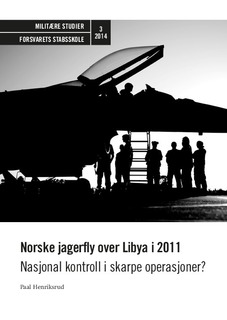| dc.description.abstract | When the Arabic Spring reached Libya in the beginning of 2011, Colonel Muammar al-Gaddafi responded with the use of violence against his own population. Adopting Resolution 1973 of 17th March 2011, the UNSCR authorized the use of all necessary means to protect Libyan civilians. As for the question of regime change, the mandate did not approve of any active military support in favour of the rebels, such as the National Transitional Council. In the subsequent Odyssey Dawn and Unified Protector operations, Norway’s relative contribution was substantial. This thesis scrutinises the extent to which the Norwegian participation was in accordance with Norway’s stated interpretation of SR 1973, namely, to protect the civilians whilst not actively supporting a regime change. Key findings suggest that Norway’s interpretation of the UN mandate was more literal and strict as compared to the robust approach of its coalition partners. Judging by their experiences, the Norwegian personnel also had to navigate between the aims of the major actors on the international scene and the national prerequisites for military contribution. | nb_NO |
